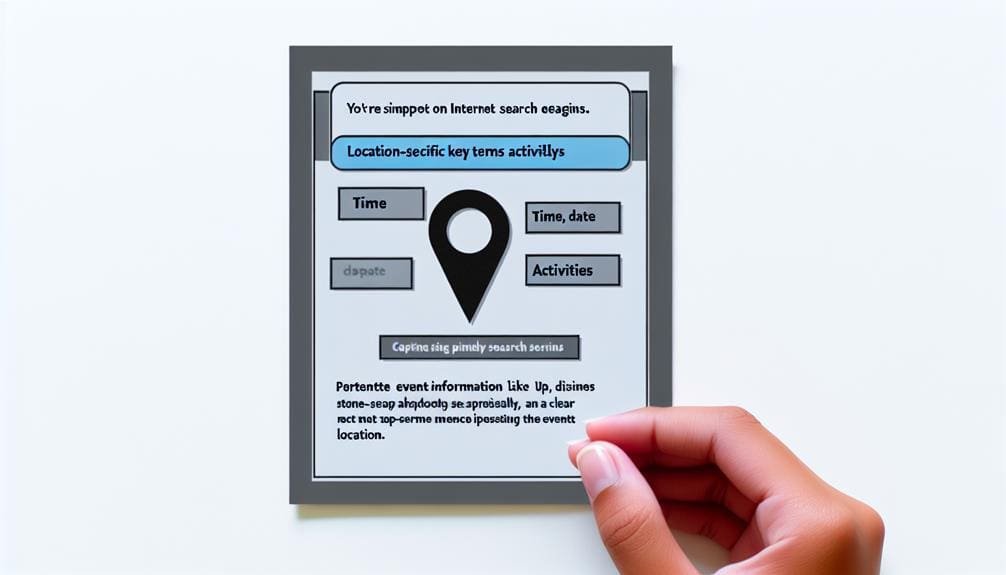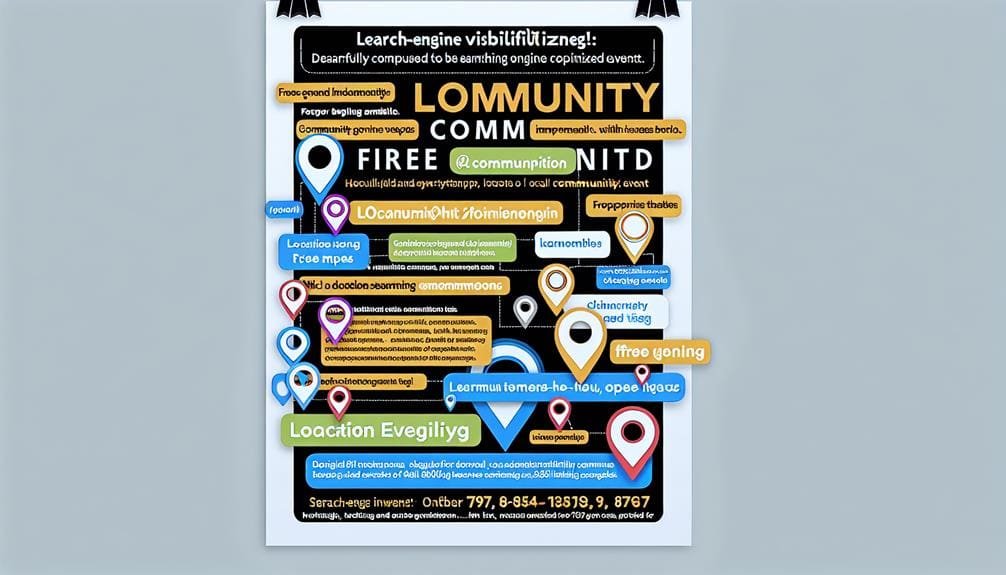What's the Key to Elevating Local Event SEO?
March 9, 2024 | by Jacob Cavazos

When it comes to elevating local event SEO, the paramount piece of the puzzle lies in targeted keyword optimization. Our data-driven approach emphasizes the strategic selection and placement of keywords to boost visibility and attract the right audience. But that's just the beginning. With a comprehensive strategy that includes implementing event schema markup, leveraging ticketing platforms, incorporating event timings, and vigilantly monitoring and adjusting listings, we're poised to unlock the full potential of local event SEO. But how do these tactics translate into tangible results? Let's explore the actionable steps and compelling insights that can propel local events to new heights in the digital landscape.
Targeted Keyword Optimization
We researched and identified relevant search terms to strategically optimize our event for specific areas, ensuring maximum visibility for our target audience. Local SEO efforts are crucial for our event to rank well in local search results. We utilized keyword research tools to pinpoint location-related keywords and incorporated them into the event title, page title, and throughout the event description and meta description. This targeted keyword optimization is essential for driving organic traffic to our event page.
In addition to the primary keywords, we also used alternative keywords and variations to diversify our content and improve our chances of ranking for a broader range of search terms. Leveraging Google Search Console, we monitored the performance of our keywords and made adjustments to our optimization strategy as needed. This data-driven approach allowed us to continuously refine our local SEO efforts.
Furthermore, we engaged in online and social marketing to promote our event and enhance its visibility on platforms for local businesses. By integrating search engine optimization (SEO) with our marketing tactics, we were able to maximize our event's reach and impact within the local community.
Implement Event Schema Markup
To further enhance our local event's search visibility and user experience, we can leverage the value of implementing event schema markup. Event schema markup provides search engines with relevant information about the event, allowing them to display rich snippets in search results. By utilizing event schema properties, we can add context to search queries and enhance the performance of our event listings. This not only improves the event experience on Google but also increases visibility in local search results.
Implementing event schema markup is crucial for optimizing our website and generating leads for local events. It allows us to provide search engines with specific details about the event, such as the event name, description, date, time, location, and organizer. By doing so, we make it easier for potential attendees to find our event online. Adding event schema to our event web page can be easily accomplished using WordPress plugins or structured data HTML code.
Leverage Ticketing Platforms

Leveraging ticketing platforms significantly enhances event exposure and search rankings, thereby boosting local event SEO. By utilizing reputable ticketing sites like Eventbrite, LiveNation, StubHub, and TicketMaster, event planners can expand event visibility and reach a larger target audience. It's crucial to ensure accurate timing information and compliance with ticketing platforms' guidelines to reap optimal search engine and attendee benefits.
Integrating ticketing platforms into event planning not only enhances online presence but also increases the likelihood of reaching potential customers. When using these platforms, it's important to optimize title tags and structured data to improve search rankings and attract local customers. Additionally, leveraging ticketing platforms can aid in promoting events through various social media channels and local news outlets, further boosting exposure and engagement.
Incorporate Event Timings
Incorporating event timings into ticketing platform listings is essential for providing clear and accurate information to potential attendees and optimizing for time-based search queries. Here's why it matters:
- Optimizing for Local SEO: Precise start and end times, along with recurring schedules, help your event rank better in local search results, making it more visible to potential attendees.
- Utilizing Structured Data: Incorporating event schema properties like startDate, endDate, and previousStartDate ensures that search engines accurately interpret your event timings, leading to better visibility and rescheduling notifications.
- Improving User Experience: Accurate event timings play a crucial role in providing a positive user experience, attracting the right audience to local events, and increasing the likelihood of attendance.
- Gaining a Competitive Edge: Including the right event timings can improve the chances of your event being featured in the event carousel, giving you a competitive edge in attracting attendees.
Monitoring and Adjusting Listings

Regularly monitoring event listings for accuracy and consistency in information is crucial for optimizing local event SEO and ensuring a positive user experience. By keeping an eye on the performance metrics of event listings, such as click-through rates and conversions, we can make data-driven adjustments to attract more customers and improve our SEO performance. It's essential to stay updated with any changes in local SEO algorithms and adjust event listings to align with new requirements. Additionally, responding to customer reviews and feedback on event listings is vital for maintaining a positive online reputation and further enhancing SEO performance.
| Action | Description | Benefit |
|---|---|---|
| Monitor Performance Metrics | Track click-through rates and conversions | Improve SEO performance |
| Stay Updated with SEO Algorithms | Align event listings with new requirements | Maintain relevance in relevant search results |
| Respond to Customer Reviews | Address feedback and maintain positive reputation | Enhance user experience and attract more customers |
Monitoring and adjusting event listings not only supports our marketing strategy but also provides a competitive edge in the local SEO landscape. Utilizing tools like Google Analytics and Search Console to track performance and make data-driven adjustments will guide our efforts to target keywords effectively and attract more traffic to our events.
Frequently Asked Questions
What Is the Best Strategy for Local Seo?
We prioritize keyword research, on-page optimization, local citations, and link building for local SEO. Leveraging Google My Business, online reviews, social media, and schema markup enriches our strategy. Mobile optimization and content creation further enhance our approach.
What Are the Three Pillars of Local Seo?
Local SEO's three pillars are local keywords, mobile optimization, and Google My Business. These pillars influence local citations, online reviews, niche directories, and social media. Link building, local content, and user experience are critical for local event SEO.
How Do I Dominate Local Seo?
To dominate local SEO, we focus on local keywords, Google My Business, local citations, niche directories, local content, customer reviews, local backlinks, on-page optimization, mobile optimization, and local link building. This strategy boosts local visibility and engagement.
What Is Optimizing for Local Search in Seo?
Optimizing for local search in SEO involves targeting local business and location-based keywords. Utilize Google My Business, online directories, and customer reviews. Focus on mobile optimization, social media, content creation, and link building for greater visibility.
RELATED POSTS
View all



